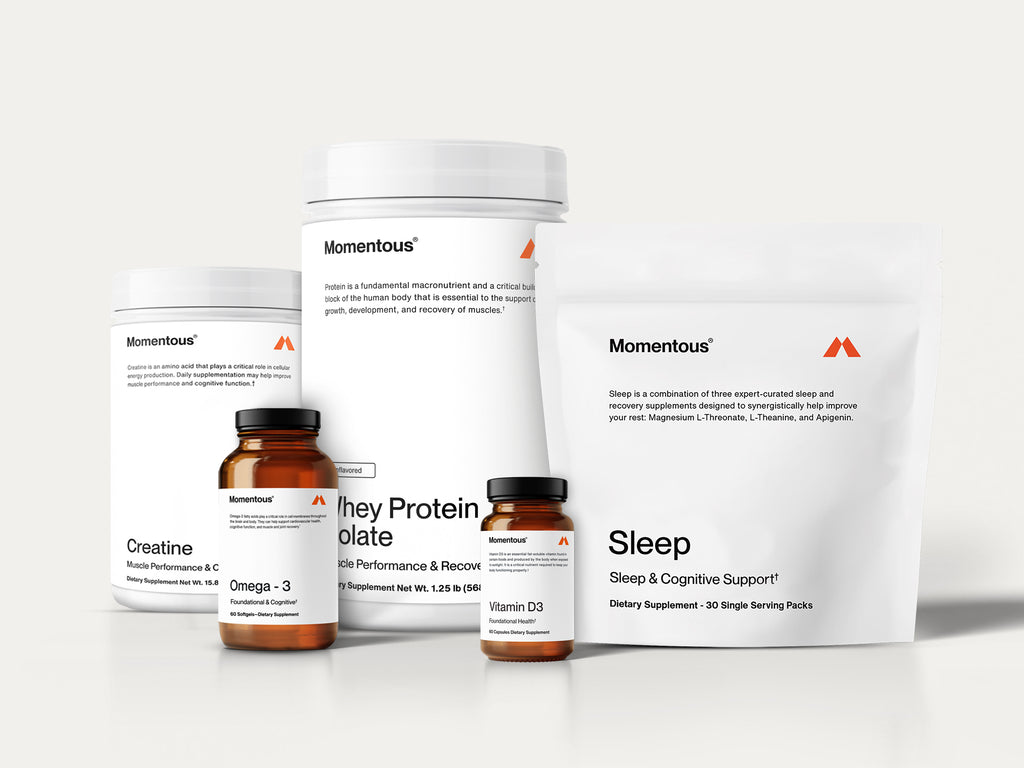Fuel vs. Hydrate – Which Momentous Option is Best for Me?
Since we launched our latest high-performance nutrition products, we’ve been getting a lot of questions from people about the use cases for each. That’s why in this week’s post, we’re diving into when you should use Momentous Fuel and when Hydrate would be the better option for your training and competition needs.
What’s my best fueling option for shorter workouts?
Momentous Hydrate is the best choice. Designed with simplicity in mind, it’s intended to help you power through fast-paced, high-intensity practices and workouts lasting less than 60 minutes. When you’re developing power, speed, and strength, your body utilizes electrolytes at an increased rate, and you also lose some through sweat (particularly when training in hot and humid conditions). This is where Hydrate comes into play. It’s an intentionally designed product that tops up the levels of electrolytes that can cause decreases in physical and cognitive performance when they dip below certain levels.
Take sodium, for example. According to a review released via Current Sports Medicine Reports, this mineral prompts you to feel thirsty and increases fluid uptake, maintenance, and replenishment around muscle tissue. Another team of researchers from Harvard Medical School and the National Institutes of Health noted that potassium – another key Momentous Hydrate ingredient – also plays a significant role in glucose and insulin metabolism. And a third study published in Redox Biology commented on the ability of zinc to enhance absorption and retention of fluids in the gut.
With these scientific studies in mind, Momentous Hydrate provides 200mg of sodium, 100mg of potassium, and 30mg of zinc to refill your electrolyte tank. Another consideration is that your highest intensity sessions deplete glycogen rapidly. This is why we also included two grams of isomaltulose, which provides a ready energy source but doesn’t spike your blood-insulin levels like the carbs in many other companies’ fueling products because it’s low on the glycemic index. And as there are just enough carbohydrates to keep you pushing hard but not too many, Hydrate won’t cause bloating, cramping, or GI distress. Simply put, Momentous Hydrate provides everything you need to make your last rep as good as your first. If you’ve been looking for a grab-and-go fueling option, Hydrate deserves a permanent place in your gym bag.
Which Momentous product is best for longer sessions, games, or races?
Momentous Fuel is the clear winner for powering longer endurance sessions. It’s specifically designed to keep you going harder for more than an hour. This precision-engineered supplement provides easily digested carbohydrates to support energy demand during prolonged exercise and also key electrolytes (sodium, potassium, magnesium, and zinc) to maintain hydration status and support muscle function.
We shared some of the benefits of maintaining adequate levels of sodium, potassium, and zinc earlier in this article. The reason that we also included magnesium in Fuel is that your body utilizes more of it during exercise than at rest, and if this essential mineral becomes depleted beyond a certain point, it can hamper your performance and increase the oxidative stress effects of exercise, per a review released in ACSM’s Health & Fitness Journal.
Another key differentiator between Fuel and other products in the marketplace is nitrates from beet root, which supports circulation and cardiovascular function. If you’ve ever tried a beet-based supplement, you might recall its distinctive taste, which is not to everyone’s liking. Should this include you, then you’re in luck, as the Fuel formula includes a clinically effective dose of nitrates while preserving a taste that all our athlete beta testers liked. A study published in Sports Medicine concluded that nitrate supplementation can improve exercise performance by between one and three percent.
A further advantage of Momentous Fuel is convenience. Endurance athletes often tell us about their frustration with using multiple fueling products – like gels, goos, and gummies – in addition to whatever fluids they carry with them during training, get from their support crew members, or grab from aid stations during races. Momentous Fuel eliminates this logistical hassle by putting electrolytes, readily absorbed carbohydrates, and endurance-supporting nitrates in one convenient formula that dissolves rapidly in water or your drink of choice. With Fuel, there’s no more guesswork, and as it’s been approved by the rigorous NSF Certified for Sport® and Informed Sport protocols, you can rest assured you’re using a product that’s free from contaminants and banned substances.
You can use Momentous Fuel effectively during your run, ride, or WOD and/or as a pre-race or game substitute for plain water. Both scenarios will give you the electrolytes, two sources of carbohydrates, nitrates, and – when mixed with liquid – fluids, you need to perform optimally and sustain your desired power or speed output for the duration of your workout, game, or race. As such, regularly utilizing Fuel will put you in the best possible position to give your all when it matters most.
This isn’t to say that selecting Momentous Hydrate or Fuel should be an either/or decision. Rather, it’s situational. When you’re doing brief workouts lasting less than 60 minutes, Hydrate is a great option, and Fuel will support your performance during longer sessions of an hour or more. We hope that between the two products, you can up your fueling and hydration game so you can get closer to reaching your goals.
1 Verle Valentine, “The Importance of Salt in the Athlete's Diet,” Current Sports Medicine Reports, August 2007, available online at https://journals.lww.com/acsm-csmr/fulltext/2007/08000/the_importance_of_salt_in_the_athlete_s_diet.9.aspx.
2John W Rowe et al, “Effect of Experimental Potassium Deficiency on Glucose and Insulin Metabolism,” Metabolism, June 1980, available online at https://www.sciencedirect.com/science/article/abs/pii/0026049580900748.
3Juan Diego Hernández-Camacho et al, “Zinc at the Crossroads of Exercise and Proteostasis,” Redox Biology, April 1, 2020, available online at https://www.ncbi.nlm.nih.gov/pmc/articles/PMC7284914/.
4Stella Lucia Volpe, “Magnesium and Athletic Performance,” ACSM’s Health & Fitness Journal, January 2008, available online at https://journals.lww.com/acsm-healthfitness/fulltext/2008/01000/magnesium_and_athletic_performance.11.aspx.
5Andrew M Jones, “Dietary Nitrate Supplementation and Exercise Performance,” Sports Medicine, May 3, 2014, available online at https://www.ncbi.nlm.nih.gov/pmc/articles/PMC4008816/.















